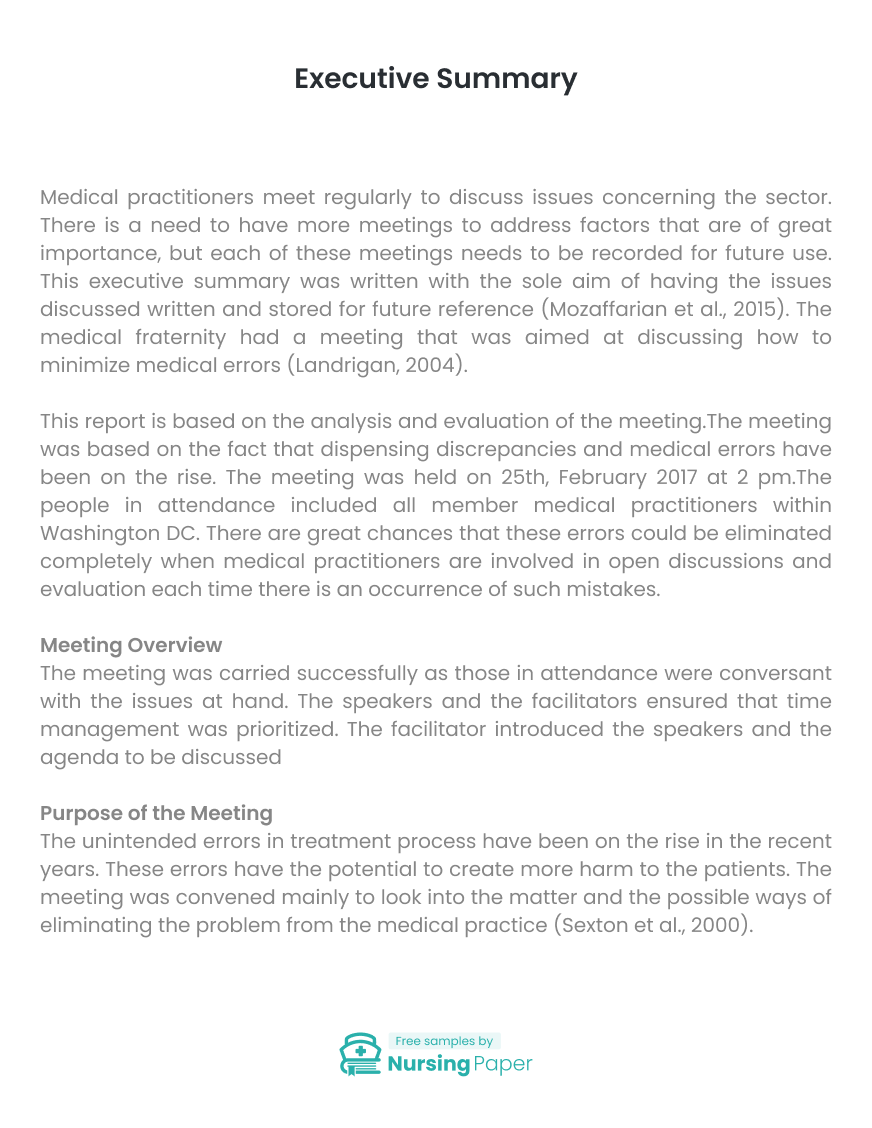
Introduction
Medical practitioners meet regularly to discuss issues concerning the sector. There is a need to have more meetings to address factors that are of great importance, but each of these meetings needs to be recorded for future use. This executive summary was written with the sole aim of having the issues discussed written and stored for future reference (Mozaffarian et al., 2015). The medical fraternity had a meeting that was aimed at discussing how to minimize medical errors (Landrigan, 2004).
This report is based on the analysis and evaluation of the meeting.The meeting was based on the fact that dispensing discrepancies and medical errors have been on the rise. The meeting was held on 25th, February 2017 at 2 pm.The people in attendance included all member medical practitioners within Washington DC. There are great chances that these errors could be eliminated completely when medical practitioners are involved in open discussions and evaluation each time there is an occurrence of such mistakes.


Meeting Overview
The meeting was carried successfully as those in attendance were conversant with the issues at hand. The speakers and the facilitators ensured that time management was prioritized. The facilitator introduced the speakers and the agenda to be discussed
Purpose of the Meeting
The unintended errors in treatment process have been on the rise in the recent years. These errors have the potential to create more harm to the patients. The meeting was convened mainly to look into the matter and the possible ways of eliminating the problem from the medical practice (Sexton et al., 2000). For this purpose, the meeting was to have all the medical practitioners within the District of Columbia to discuss the way forward.
The Agenda
The agenda of the meeting included the following;

- Good practice guide
- Legal requirements
- Role of medical practitioners
- Communication on medical errors
The Leadership Style
The meeting was conducted through participatory leadership style. The speakers gave those in attendance to give out their views on the various (Risser et al., 1999). The attendants were grouped into small groups where they discussed the various topics before they were brought back together.
Team Dynamics
The team participation was of great importance. Every member of the team was valued and their contributions are taken seriously. The respect accorded to the team members was a major factor in motivating members to be open during the discussions. The use of group discussion allowed recognition of each member and their contributions.
Team Effectiveness
The team had well-balanced roles. The team members had a clear understanding of the roles each member should play. The different abilities, skills, and aspirations of each team member were balanced hence ensuring the achievement of an effective team with balanced roles.



Future Agenda
The team agreed to have more regular meetings to discuss and encourage each other to stick to the course. The team members would update each other on their progress and liaise with other departments for the purposes of improving services and eliminating the identified error.
Innovation Promotion
Open discussions on the issues of medical importance promote innovations in the medical field. Members brainstorm on a variety of solutions to the existing problem. The members are able to come with new ways that never existed before.
Conclusion
Medical errors are serious issues in the medical field. More forums should be created to enable medical practitioners to discuss the problem. Regular meetings and conference are the best way to help each other in the medical fraternity to overcome the daily changes faced in the field.
1. Landrigan, C. P., Rothschild, J. M., Cronin, J. W., Kaushal, R., Burdick, E., Katz, J. T., … & Czeisler, C. A. (2004). Effect of reducing interns’ work hours on serious medical errors in intensive care units. New England Journal of Medicine, 351(18), 1838-1848.
2. Mozaffarian, D., Benjamin, E. J., Go, A. S., Arnett, D. K., Blaha, M. J., Cushman, M., … & Huffman, M. D. (2015). Executive summary. Circulation, 131(4), 434-441.
3. Risser, D. T., Rice, M. M., Salisbury, M. L., Simon, R., Jay, G. D., Berns, S. D., & MedTeams Research Consortium. (1999). The potential for improved teamwork to reduce medical errors in the emergency department. Annals of emergency medicine, 34(3), 373-383.
4. Sexton, J. B., Thomas, E. J., & Helmreich, R. L. (2000). Error, stress, and teamwork in medicine and aviation: cross sectional surveys. Bmj, 320(7237), 745-749.



The download will start shortly.

The download will start shortly.
 Subject:
Nursing
Subject:
Nursing  Number of pages: 6
Number of pages: 6  Subject:
Nursing
Subject:
Nursing  Number of pages: 13
Number of pages: 13  Subject:
Nursing
Subject:
Nursing  Number of pages: 6
Number of pages: 6  Subject:
Nursing
Subject:
Nursing  Number of pages: 3
Number of pages: 3  Subject:
Medicine
Subject:
Medicine  Number of pages: 3
Number of pages: 3  Subject:
Health and Social Care
Subject:
Health and Social Care  Number of pages: 2
Number of pages: 2  Subject:
Nursing
Subject:
Nursing  Number of pages: 8
Number of pages: 8  Subject:
Health and Social Care
Subject:
Health and Social Care  Number of pages: 2
Number of pages: 2  Subject:
Health and Social Care
Subject:
Health and Social Care  Number of pages: 2
Number of pages: 2  Subject:
Nursing
Subject:
Nursing  Number of pages: 2
Number of pages: 2  Subject:
Nursing
Subject:
Nursing  Number of pages: 10
Number of pages: 10  Subject:
Health and Social Care
Subject:
Health and Social Care  Number of pages: 6
Number of pages: 6  Subject:
Nursing
Subject:
Nursing  Number of pages: 4
Number of pages: 4  Subject:
Health and Social Care
Subject:
Health and Social Care  Number of pages: 2
Number of pages: 2  Subject:
Health and Social Care
Subject:
Health and Social Care  Number of pages: 8
Number of pages: 8 
